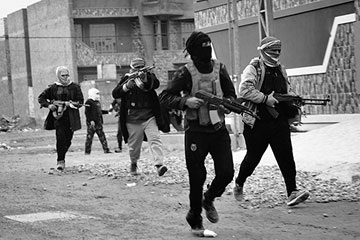
Tribal fighters patrol Fallujah streets on Jan. 5 as the Iraqi government faces off against al-Qaeda forces.
(3 of 6)
Baghdadi's self-preservation skills have proved vital as the conflict in Syria has devolved into a fragmented and chaotic multifront war in which friends quickly become enemies. ISIS and other al-Qaeda affiliates there are battling Assad alongside moderate and Islamist rebels. But Baghdadi's goal is to establish an Islamic empire anchored in Syria and based on a literalist interpretation of Islamic law, which has put him at odds with other, less conservative insurgents, whose primary goal is the overthrow of the Assad regime. Already Baghdadi has engaged rebel groups that he deemed insufficiently Islamic, forcibly taking towns controlled by moderates.
If such predatory tactics have made Baghdadi enemies among Syria's anti-Assad rebels, his leadership qualities have attracted followers from among the many foreign fighters who have gone to Syria in search of jihadi glory over the past 2½ years. And he has built his forces in other ways. On July 21, about 50 ISIS fighters armed with machine guns and grenades launched a bold attack on Iraq's most heavily fortified prison, on the outskirts of Baghdad, breaching its huge walls with mortars and car bombs to free an estimated 500 al-Qaeda militants. Many of the liberated prisoners were high-value al-Qaeda operatives, battlefield tacticians and bombmakers--some arrested by U.S. troops before their 2011 withdrawal--and shaky videos showed the exultant terrorists piling into the backs of Toyota pickup trucks destined for Syria and the deserts of western Iraq.
Dreams of the Caliphate
Baghdadi doesn't just fight; he holds terrain. In the northern Iraqi city of Mosul, whose population is nearly 2 million, ISIS is so strong that Baghdadi's operatives collect unofficial taxes to support their cause unmolested. ISIS has taken several frontier posts on the Syrian side of that nation's border with Turkey (a U.S. ally and NATO member), including the strategic town of Azaz in September. It has also captured Syrian oil fields and refineries, which help it generate income locally. ISIS's 6,000 to 10,000 well-equipped soldiers, heavy weaponry and sophisticated attacks are evidence of Baghdadi's other robust funding streams, including kidnapping for ransom and donations from private supporters in the Gulf.
In March 2013, ISIS took over the Syrian city of Raqqa and its environs, where an influx of citizens fleeing the war had swelled the population to 1 million, making it the largest municipality ever solely administered by an al-Qaeda affiliate. There Baghdadi began establishing the trappings of government. He quickly set up Islamic courts and took control of the distribution of humanitarian aid, handing out fuel to residents and ensuring a steady supply of electricity to the city. ISIS established a school in Raqqa and late last year launched a bus service to the surrounding villages.
